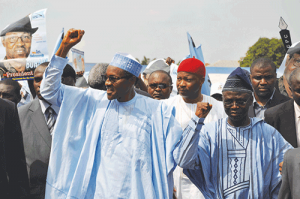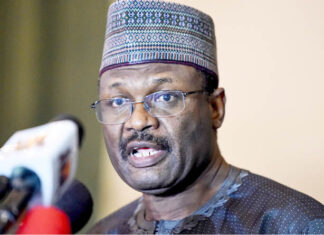Assistant Politics Editor, DANIEL KANU, examines some of the pledges by the president-elect, Muhammadu Buhari, during his campaign and how far he can go in keeping them.
 The end eventually came for the 16 years of Peoples Democratic Party (PDP) administration at the centre, as the major opposition party, the All Progressives Congress (APC) on Saturday, March 28, trounced it in a keenly-contested presidential and National Assembly elections.
The end eventually came for the 16 years of Peoples Democratic Party (PDP) administration at the centre, as the major opposition party, the All Progressives Congress (APC) on Saturday, March 28, trounced it in a keenly-contested presidential and National Assembly elections.
Consequently, President Goodluck Jonathan will, on May 29, hand over to Buhari who will then be saddled with the burden of leadership in the country.
Now that the party is over, the fundamental question to ask is whether Buhari can achieve all that he promised Nigerians during electioneering.
Buhari’s APC prides itself as a new party for a new Nigeria, with a philosophy that will be centred on the welfare of the common man, the assurance of a great future for the people, and a decent quality of life for all.
The APC had on March last year rolled out its roadmap on how to transform the country in all the sectors, to bring about the radical change it preached about.
The 10-point agenda the party disclosed then covered areas of job creation, fighting corruption, free relevant quality education, restoring agriculture, housing plan, healthcare plan for children and adults, social welfare plan for the less-advantaged, building roads, power and infrastructure, better management of natural resources, strengthening peace, security and foreign policy.
Critics say the APC roadmap sounds sweet and enticing, just like the usual promises Nigerians were accustomed to since 1999, but that the problem has always been on lack of political will by the leadership on implementation and monitoring.
Some even dismiss the promises by the party as mere campaign gimmick that are unrealisable.
They recall, for instance, that just as Jonathan, the late Umaru Yar’Adua and Olusegun Obasanjo had advertised their various transformation plans, at the end the nation was not better off due to execution strategies that were essentially marred by corruption.
Some political commentators have particularly expressed worry on the cost of projects which Buhari is expected to implement, arguing that the party may perhaps be ignorant of the real cost involved.
“If the APC knows the real cost of their 10-point roadmap programme and where it will generate the funds to execute the projects, it would have told Nigerians. All they (APC leaders) are brandishing is purely cosmetic, just to win election,” an analyst who preferred anonymity, told TheNiche.
Even former Central Bank of Nigeria (CBN) Governor, Prof. Chukwuma Soludo, at the heat of the election campaigns, accused both the PDP and APC of not properly addressing the real issues of economy, power, unemployment, insecurity etc., particularly on how they intend to provide the solution beyond election rhetoric.
Soludo had said: “Let me admit that the two main parties talk around the major development challenges – corruption, insecurity, economy (unemployment/poverty, power, infrastructure, etc.) health, education, etc. However, it is my considered view that none of them has any credible agenda to deal with the issues, especially within the context of the evolving global economy and Nigeria’s broken public finance.
“The UK Conservative Party’s manifesto for the last election proudly announced that all its programmes were fully costed and were therefore implementable. Neither APC nor PDP can make a similar claim. A plan without the dollar or naira signs to it is nothing but a wish-list. They are not telling us how much each of their promises will cost and where they will get the money. None talks about the broken or near bankrupt public finance and the strategy to fix it.”
With the continued dwindling fortunes of the nation’s mono- economy, an economy based solely on oil, in addition to the crashing of oil price at the international market, political observers have raised the alarm that reinventing the country would pose huge challenge for the retired General unless something drastic is done on the non-oil sector like in agriculture, tourism, entertainment etc.
It is undisputable that Nigeria was once a leading agricultural producer, even helping feed other parts of the world. All that has become history. Today, the story is that of decline in productivity as a result of neglect of the sector. How soon Buhari will turn around the economy, political commentators agree, will be known from the choice of his economic team.
The integrity of the president-elect is also an issue that many count on, in this instance. He had, for instance, asked Nigerians to hold him on his promise of maintaining sound micro and macro-economic policy environment, and running an efficient government, as well as preserving the independence of the CBN.
The General had also pledged to “restore financial confidence in the citizens and the world, by putting in place a more robust monitoring, supervising and regulating of the financial institutions; making the economy one of the fastest growing emerging economies in the world with a real GDP growth averaging at least 10 annually”. His party has given assurance of unfolding a template in going about these principles on My 29. Nigerians who have borne the brunt of bad governance in the last 16 years can hardly wait for these assurances to be translated into action.
Another issue that Buhari had told Nigerians that he was going to tackle was corruption. And he had every reason to, his supporters and critics, say. The menace is, for example, seen as a major factor that has been holding the country from attaining the height envisioned for it by the founding fathers at Independence. Some leading international organisations have continually cited Nigeria as having one of the highest levels of corruption index in the world, a true badge of shame.
Interestingly, Buhari said in one of his interviews that on the issue of corruption, there can be no doubt as to where he stands. Of course, he is one known to have integrity, given his antecedents. The argument by some, however, is that now that he will become a democratic president, there are bound to be limitations on his powers, especially as he would no longer act with fiat as he had done when he was a military head of state.
Arresting the menace, observers say, equally goes beyond sloganeering, but putting more energy on the ground to get at its very root. It is argued, for instance, that with many states owing workers’ salaries and other emoluments, it may require new strategy to wipe out corruption.
Also Nigerians would want to see how he would confront some perceived crooks milling around him. Buhari pledged to lead by example with the support of Nigerians. Political analysts, thus, contend that if his war on corruption is not that of witch-hunting opponents but bringing corrupt individuals to face the wrath of the law, he would succeed.
The issue of security challenge is also critical. The North East part of the country is already at the mercy of the murderous activities of Boko Haram, a terror group that has continued to waste the blood of more than 15,000 innocent Nigerians. The sect took its activities to an audacious level, when it kidnapped over 200 girls from a secondary school in Chibok, a Borno community, last year. The girls are yet to be located.
But Buhari has vowed to confront the situation head-on, stressing that he will urgently secure the territorial integrity of the nation.
He said: “I will never leave the defence of the nation in the hands of hunters, children, and civilian Joint Task Force (JTF). We know what to do. I will urgently address capacity building mechanisms of law enforcement agents in terms of quantity and quality as this is critical in safeguarding the sanctity of lives and property.”
Many believe him, arguing that as a former head of state and two-star General, he would not handle the group with kid gloves. This is especially because how he handles the situation would be one of the major issues that would make or break his government.
Another critical issue is power, which seems to have defiled all solutions. How far Buhari can go in the power sector to dislodge the cabal frustrating the success in the sector, according to industry watchers, will be a fascinating story for Nigerians.
There are some promises Buhari made that may look as if they are minor, but a closer look at them has remained quite revealing. For instance, there is the promise of one free meal per pupil per day.
TheNiche findings show, for instance, that feeding 10 million kids per day at the rate of N150 per meal will be at about N1.5 billion daily. Critics are yet to be convinced on the strategies by the government to raise the funds for this obviously ambitious venture.
But an economist, Roland Ukah, remarked that what APC promised Nigerians are all achievable, given the resources, both human and natural, that abound.
“What Buhari needs to do is just to stop the sleaze, block loopholes, create wealth from the non-oil sectors and choose a good team to run with. Already, he has a face that will drive Nigerians to trust him,” he argued.
Admirers of the General, also state that he has an appellation that can make things happen for a better Nigeria, but that he would need to sit up and look beyond party lines to choose his team of game-changers for the onerous task ahead.













